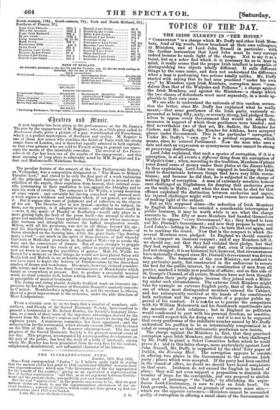The peculiar feature of the concert of the New Philharmonic
Society, on Wednesday, was a composition designated as "The Music to Milton's Paradise Lost," and stated to be only the first part of a work embracing all the principal features of the poem. This first part is devoted to the rebellion of the angels, their expulsion from heaven, their infernal coin- oils, terminating in their resolution to rise against the Almighty and to ruin his work of creation. The composer is Dr. Wylde, a young musician of some repute : and certainly his having conceived and planned such a work argues a boldness and ambition which, if not genius, are akin to it. But it argues also want of judgment and of reflection on the objects of his art. The Paradise Lost is not lyrical—neither in its subject, its form, nor its poetry, is it adapted to music ; and all that music could do —were it the music of Handel or Beethoven—would only place in a more glaring light the fault of the poem itself—the attempt to clothe in gross and material forms those spiritual existences from whose immeasur- able vastness and intangible essence the baffled imagination recoils. Milton, with all his greatness, was not in all things beyond his age ; and his descriptions of the fallen angels and their infernal abode—of Satan stretched on the burning lake, while his giant limbs "lay floating many a rood "—are much in the spirit of those pictures of hell whereby Calvinist or Methodist preachers in Scotland or Wales try to awake the fears and the consciences of sinners. But all such attempts to grapple with what is beyond the reach of art, either in poetry or painting, are now set down as among the puerilities of genius. Had Dr. Wylde re- flected for a moment on these things, he would not have placed Satan and Beelzebub and Moloch in an orchestra, singing airs and concerted pieces, nor have tried to depict the horrors of Pandemonium by the discordant crashes of drums and trombones. His music, however, evinced consider- able talent, and was free from those reminiscences of Mendelssohn which haunt us everywhere at present. But, to produce a successful musical work, he must consider well, before setting about it, whether the subject is susceptible of musical treatment.
The young and rising pianist Arabella Goddard made an immense im- pression by her fine performance of Stemdale Bennett's masterly concerto in C minor. Mendelssohn's symphony in A, and the overture to Oberon, showed a great improvement in the orchestra, under the able direction of Herr Lindpaintner.


























 Previous page
Previous page